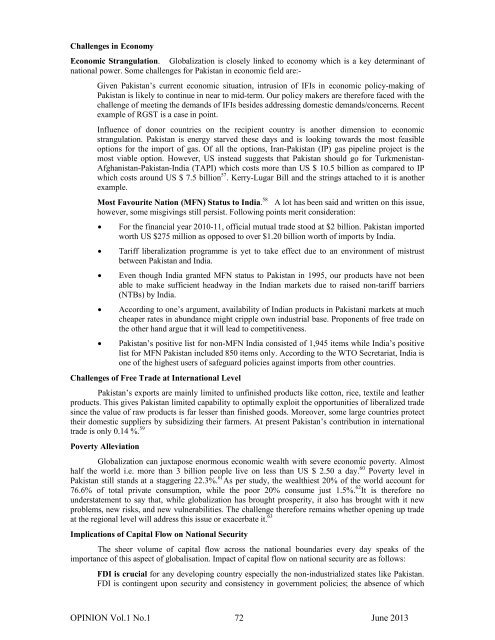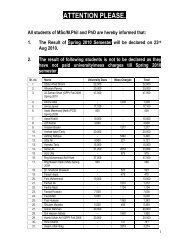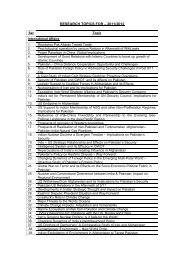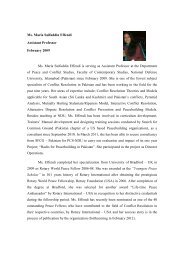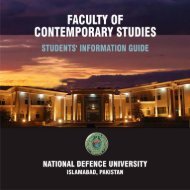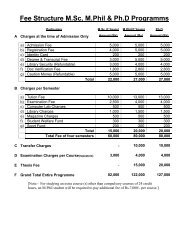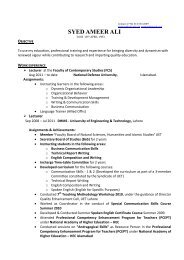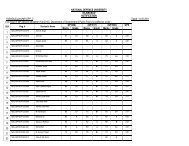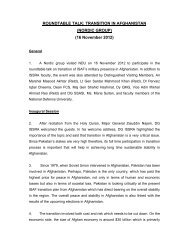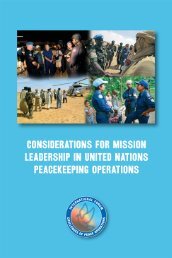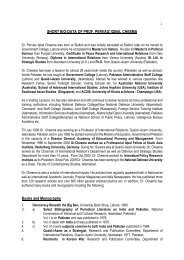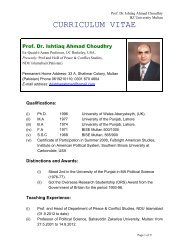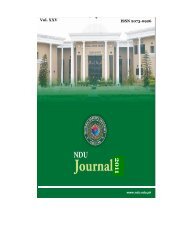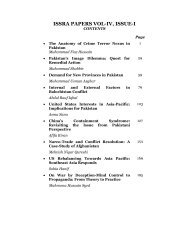OPINION Vol.1, No.1 June 2013 - National Defence University
OPINION Vol.1, No.1 June 2013 - National Defence University
OPINION Vol.1, No.1 June 2013 - National Defence University
You also want an ePaper? Increase the reach of your titles
YUMPU automatically turns print PDFs into web optimized ePapers that Google loves.
Challenges in Economy<br />
Economic Strangulation. Globalization is closely linked to economy which is a key determinant of<br />
national power. Some challenges for Pakistan in economic field are:-<br />
Given Pakistan’s current economic situation, intrusion of IFIs in economic policy-making of<br />
Pakistan is likely to continue in near to mid-term. Our policy makers are therefore faced with the<br />
challenge of meeting the demands of IFIs besides addressing domestic demands/concerns. Recent<br />
example of RGST is a case in point.<br />
Influence of donor countries on the recipient country is another dimension to economic<br />
strangulation. Pakistan is energy starved these days and is looking towards the most feasible<br />
options for the import of gas. Of all the options, Iran-Pakistan (IP) gas pipeline project is the<br />
most viable option. However, US instead suggests that Pakistan should go for Turkmenistan-<br />
Afghanistan-Pakistan-India (TAPI) which costs more than US $ 10.5 billion as compared to IP<br />
which costs around US $ 7.5 billion 57 . Kerry-Lugar Bill and the strings attached to it is another<br />
example.<br />
Most Favourite Nation (MFN) Status to India. 58 A lot has been said and written on this issue,<br />
however, some misgivings still persist. Following points merit consideration:<br />
<br />
<br />
<br />
<br />
<br />
For the financial year 2010-11, official mutual trade stood at $2 billion. Pakistan imported<br />
worth US $275 million as opposed to over $1.20 billion worth of imports by India.<br />
Tariff liberalization programme is yet to take effect due to an environment of mistrust<br />
between Pakistan and India.<br />
Even though India granted MFN status to Pakistan in 1995, our products have not been<br />
able to make sufficient headway in the Indian markets due to raised non-tariff barriers<br />
(NTBs) by India.<br />
According to one’s argument, availability of Indian products in Pakistani markets at much<br />
cheaper rates in abundance might cripple own industrial base. Proponents of free trade on<br />
the other hand argue that it will lead to competitiveness.<br />
Pakistan’s positive list for non-MFN India consisted of 1,945 items while India’s positive<br />
list for MFN Pakistan included 850 items only. According to the WTO Secretariat, India is<br />
one of the highest users of safeguard policies against imports from other countries.<br />
Challenges of Free Trade at International Level<br />
Pakistan’s exports are mainly limited to unfinished products like cotton, rice, textile and leather<br />
products. This gives Pakistan limited capability to optimally exploit the opportunities of liberalized trade<br />
since the value of raw products is far lesser than finished goods. Moreover, some large countries protect<br />
their domestic suppliers by subsidizing their farmers. At present Pakistan’s contribution in international<br />
trade is only 0.14 %. 59<br />
Poverty Alleviation<br />
Globalization can juxtapose enormous economic wealth with severe economic poverty. Almost<br />
half the world i.e. more than 3 billion people live on less than US $ 2.50 a day. 60 Poverty level in<br />
Pakistan still stands at a staggering 22.3%. 61 As per study, the wealthiest 20% of the world account for<br />
76.6% of total private consumption, while the poor 20% consume just 1.5%. 62 It is therefore no<br />
understatement to say that, while globalization has brought prosperity, it also has brought with it new<br />
problems, new risks, and new vulnerabilities. The challenge therefore remains whether opening up trade<br />
at the regional level will address this issue or exacerbate it. 63<br />
Implications of Capital Flow on <strong>National</strong> Security<br />
The sheer volume of capital flow across the national boundaries every day speaks of the<br />
importance of this aspect of globalisation. Impact of capital flow on national security are as follows:<br />
FDI is crucial for any developing country especially the non-industrialized states like Pakistan.<br />
FDI is contingent upon security and consistency in government policies; the absence of which<br />
<strong>OPINION</strong> <strong>Vol.1</strong> <strong>No.1</strong> 72 <strong>June</strong> <strong>2013</strong>


